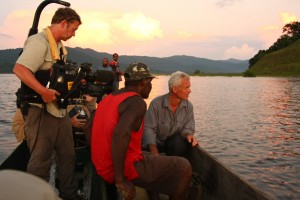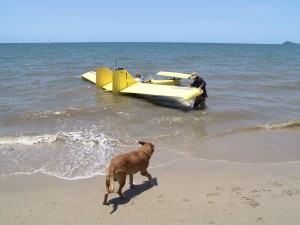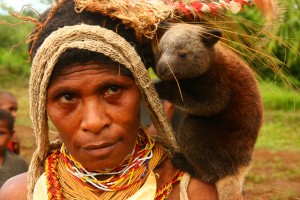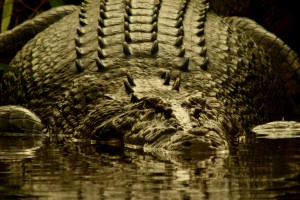Filming on location in Papua New Guinea with fixer Paul O’Dowd
Paul O’Dowd started his career running a diving outfit in Papua New Guinea. His knowledge of natural history led to work with filmmakers and media production. O’Dowd now describes himself as a consulting naturalist and fixer for remote expeditionary projects.
 Where specifically do you operate?
Where specifically do you operate?
Although I am particularly associated with Papua New Guinea, my work now takes me to Asia, the Middle East, Central America and the ‘Stans’ for projects ranging from documentaries and ‘reality’ shows to high-stakes wildlife conservation biology expeditions. Location managing is just a part of the range of services that my company Venture Deeper provides for anyone seeking access and understanding in some of the wildest landscapes on the planet.
What do you like most about being a Location Manager?
Fixing and Location Managing have afforded me the opportunity to experience things that few people ever get to do or see. From joking with cannibals and discovering new species of plants and animals, to working with some of the best people on Earth in their various fields.
What types of productions do you prefer working on?
Documentary productions are by far my preferred type of job. The crews are usually small and highly disciplined. The small scale requires a lot of flexibility and the need to be useful across the full spectrum of the film production skill set. It really challenges the mind and keeps things interesting. I also believe that this genre can represent a socially valuable use of the medium of television. Many documentary productions have the capacity to remain useful to future generations in ways that a lot of today’s media content just does not.
 What productions have you most enjoyed working with over the years?
What productions have you most enjoyed working with over the years?
Steve Greenwood is an interesting producer/director who has impressed me with his vision of how to reach the minds of young people through the documentaries and reality shows. I worked with Steve and his inspired assistant Daniel Heurtas on Lost Land of the Volcano in 2008/09.
What has been your most challenging location assignment to date?
It would be a close contest between Lost Land of the Volcano and the second series of Survivor.
What does Papua New Guinea have to offer as a filming location?
Although I live in Australia and I do ply my film services here, my specialty region is really Papua New Guinea where my language and cultural understanding give me a pretty big advantage. I am able to work with the landscapes and tribesfolk of very remote regions to great effect and I get results that many operators struggle to replicate when pursuing their targets in that chaotic, beautiful land.
Documentary productions are by far my preferred type of job. The crews are usually small and highly disciplined.
Papua New Guinea is an extremely diverse country, physically, culturally and biologically. We have idyllic beaches and villages, chaotic and menacing towns, high-forested mountains, vast rivers and swamps, island archipelagos and marine environments with the world’s best coral reefs. There are hundreds of amazing wrecks and walls that drop off from the shore vertically into the continental abyss.
What are the types of locations for which you have specialist knowledge?
My learning in the natural sciences has been very broad and I apply it to a wide range of predominantly tropical environments. I am known for my reef and rainforest work, with a particular emphasis on the interdependencies between the land and seascapes of tropical coastlines.
 What local tips about filming in these types of locations could you share?
What local tips about filming in these types of locations could you share?
If you are going to film in Papua New Guinea, start your permit application process as soon as you have nailed down the dates and objectives. I advise the same for the filming visa application process. It can be a laborious and frustrating chore and needs to be initiated with plenty of time to spare. You might be pleasantly surprised but just as likely your stuff will go missing or the person handling it may just leave the job and leave you hanging. If you can get someone to shadow the process and help hustle it along a bit from that end, you would be wise and well served.
Don’t underestimate the absolute importance of language in the Melanesian mindset. Even if they speak perfect English, a small effort on your part to embrace a bit of language can be the difference between awesome co-operation and very little interest in your project on the part of the people you deal with there.
 Are there any production service companies you would like to give a special mention?
Are there any production service companies you would like to give a special mention?
Trans Niugini Tours is an incredible source of film and TV logistics support and local knowledge. They have worked with many of the leading lights in the field of documentary production. Their network of wilderness lodges and their in-house airline are just the start. They have been in the country forever and are an island of reliability in what can be a confusing nation.
Does Papua New Guinea offer good production value?
It really is the last frontier. As such, things tend to be fairly expensive compared to places in which a good road will get you to where you need to be. Most projects outside the cities are heavily dependent on aviation and expeditionary logistics. Once on the ground there is no shortage of willing help for which wages are fairly affordable. On some jobs, I have gone in months early to train teams of villagers in the skill sets needed for a production support crew. This has worked out well and is a great way to get the blessing of the people whose landscape you are using. This can have an agreeable impact on location fees.
Thank you
To contact Paul click here.
Related Posts
- The Location Guide talks to Lieutenant Colonel Glen Roberts, Director of the United States Air Force Entertainment Liaison Office
- On location with Michael Brook, Manager of Screen Auckland
- Moonlight beats La La Land for Best Picture at the 2017 Academy Awards
- On location with Bénédicte Vernier of the New Caledonia Film Commission
- I, Daniel Blake named Outstanding British Film at the BAFTAs
- On location in San Francisco with Film SF Executive Director Susannah Greason Robbins
- German feature shoots in Malaysian jungle
- Filming in Argentina with Assistant Director Ginger Gentile
Related posts:
Comments
Not Logged in
You must be logged in to post a comment
There are no comments